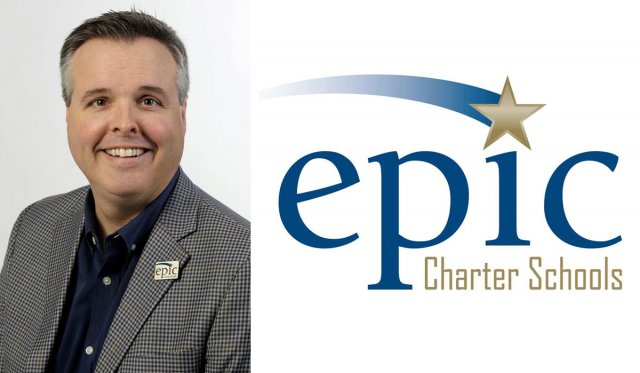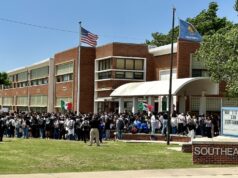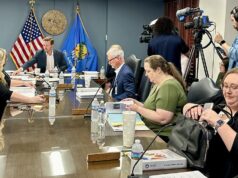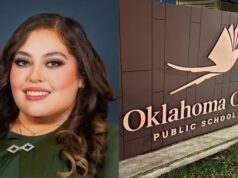Epic Charter Schools co-founder Ben Harris is not known for speaking extensively to media, so when he exited through a locked door I was trying to enter Monday evening, I stopped in my tracks and turned on my recording device.
When it comes to interviewing influential people unexpectedly, it was not my first rodeo. As a journalist covering the Oklahoma State Capitol, I occasionally cross paths with the governor, legislative leaders or even visiting congresspersons when I least expect it. Sometimes I turn the corner and — BAM — there’s my chance to ask a couple questions in a more casual setting than a press conference.
Harris, of course, has not done many (any?) press conferences since his pair of virtual charter schools came under criminal investigation in 2013 for allegations of misusing state funds. And why would he?
Aside from a damning audit by State Auditor & Inspector Cindy Byrd and a complicated lawsuit from Byrd’s office over financial records within Harris and co-founder David Chaney’s private management company called Epic Youth Services, Harris has watched his virtual charter schools experience rampant enrollment growth among families seeking a different style of school environment for their children.
The pandemic’s arrival in 2020 only drove more students to Epic, so many that Epic received an additional $156 million this month thanks to the state’s “mid-year adjustment” for enrollment changes. A barrage of negative headlines and social media criticism has not dissuaded families from choosing Epic, even as its governing board — called Community Strategies — has met to approve corrective action plans in the wake of the state audit.
Monday night, our education reporter, Megan Prather, was watching the Epic board meetings via Facebook livestream amid the comfort of social distancing. But when I reached out to see how her story was shaping up, she noted that the livestream had ended during the first Epic board’s executive session. I sent her the contact information for Shelley Hickman, Epic’s manager of external affairs, who responded with another video link — that also was not working.
That’s when I decided to head to the Epic board meeting myself. Upon reaching 50 Penn Place, I tried the east doors where an escalator runs directly to Epic’s offices. They were locked. Back in my car, I drove up a ramp to a covered parking area. The garage gates were down, but I could see cars within. I parked and jogged through the garage to the building’s south doors, confused by a white BMW SUV that was running while empty. The north doors were also locked.
I called Hickman, who said the meeting had just ended and that she was exiting through the west doors. As I explained how other doors to the office building had been locked, the north doors burst open and I recognized Ben Harris behind a mask.
I identified myself and said I had been trying to reach the board meeting. He held the door open for me to go in and find others who were not yet leaving. I turned on my recorder and said I had a couple of questions, which I was glad he answered.
The following is a transcript of our impromptu interview, replete with small talk as my harried brain strained to think of how to keep my conversation going with the co-founder of Oklahoma’s largest — and most controversial — school district.
Interview with Ben Harris, 9:40 p.m. Monday, Jan. 25
(Editor’s note: The recording — embedded below — picks up seconds after the initial interaction.)
Savage: I couldn’t figure out and —
Harris: Come on in.
Savage: Well, I was just talking to Shelley (Hickman), it was, I guess, over.
Harris: Shelley is still here if you want to talk to her.
Savage: Who is?
Harris: Shelley.
Savage: She was going out the other direction, so I apologize for that.
Harris: I’m sorry you couldn’t get in.
Savage: How did things go in there? Was there any action taken on item No. 10, do you remember? The second meeting?
Harris: What item 10 was it?
Savage: I think it was the corrective action deal.
Harris: Oh, the corrective action got corrected by the [State Department of Education]. They wanted some changes. We made changes. The SDE wanted that to be approved by our board. So the board approved the corrective action plan.
Savage: OK, I’ll get Shelley to send me that.
Harris: And the corrective action plan, just so you’ll know, it wasn’t like a global corrective plan. It was simply regarding a federal funding corrective action plan, which is a routine submission we make. But it’s a routine submission we make that the SDE sent back and we redid it. I’m really sorry …
Savage: No, you’re good. I was at that door and came over this way, and — cause the stream cut out and my journalist — I live down the road, so …
Harris: I’m happy to get Shelley if you want to sit down and talk.
Savage: Yeah, no, that’s good. Well, I reckon you’re the fella who has created this amazing enterprise or whatever, so I’m glad I caught you. Can you tell me, are you guys going to — are you paying back the [$11.2 million] that OSDE wants, or are you challenging that? Where does that stand?
Harris: Well, we’re in discussions with them. The clock just started on the 60 days as of late last week, so we have until March 24 to demonstrate to OSDE that we either owe no money or owe less money than what has been demanded. And we’re preparing that presentation, and we hope to engage with the State Department within the next couple of weeks whenever they are ready.
Savage: Last thing on the — umm, uhh — I guess it would be on the …
Harris: Mind if I take this thing off? I don’t know if you’re recording this.
Savage: Yeah, I am. I was trying to be transparent with that.
Harris: I might be pretty muffled.
Savage: Well, I know a couple things are going on. The Legislature is looking at doing some things that you might not love. They’re looking at changing the three-year [enrollment and funding formula], and that’s kind of awkward now that you guys have such good enrollment because you guys have been doing distance learning for about a decade and you’re benefiting from it now. So, where do you think — the Legislature seems like they’re trying to come after you guys. What’s your message, and what do you think about some of the stuff they are filing?
Harris: We want to work with the Legislature. We haven’t seen the particular bills that you’re referencing. We think the three-year high is something that deserves discussion, and we just want to be part of the discussion and have a seat at the table.
Savage: What other things do you want people to know about Epic right now? You guys kind of get beat up a lot. I’m not trying to do that here myself, you know.
Harris: Well, our primary focus is we are trying to serve all of the families that are with us, and that’s going to be our primary focus. As far as being beat up, I think any time you grow like we’ve grown and disrupt a sector that hasn’t been disrupted before, you’re going to get a lot of pushback. We’ve gotten that since our inception, so we’re used to it, and I think we are just going to continue to tell the truth and put forward the facts, and we feel comfortable we will be vindicated and we will be here for a long time.
Savage: The last thing I’ve kind of got is that there’s a big question and court case pending still about whether the records related to the Learning Fund should be public records. And I get it. I mean, I usually err on the side of public records. I’m a journalist …
Harris: Understood.
Savage: … on the other hand I run a nonprofit and I have contractural agreements and things like that, so what do you tell people who might look at that and say, “Well, they’re not going to turn it over, so there must be something wrong in those records.” What is the professional reason for you guys needing to keep that kind of behind a closed door?
Harris: We’ve actually offered to turn them over, but when turning them over we wanted to make sure that that was judged by a private standard and not a public one. Because those records have been declared private and managed in a way that was compliant private and not public compliant, which is a different set of rules. I think our objection is we don’t want a retroactive ruling that changes the rules after the fact. And then that makes us look like we didn’t follow the rules, because we did. So we’ve offered to let people see the records under a protective order, and they weren’t interested in that. But I think from a standpoint of public transparency, we want to increase transparency as well, and we don’t have anything to hide with the Learning Fund, and we’re working on ways that we can increase that transparency.
Savage: Anything else you want to add that I didn’t get to ask you about? I hate I grabbed you as you were walking out.
Harris: No, it’s OK. I feel bad because you couldn’t get in the building.
Savage: No, I just ran over because Megan lives in Edmond and I live down the street, and I asked her how the story was going, and she said, ‘Well the stream cut out,’ and she was texting with Shelley and I was like, “Well I’ll just drive over there.” And I was trying to go in that door first, and I came to this one, and I called Shelley trying to figure out which door I go in.
Harris: I got you. Yeah, we just were late.
Savage: Yeah, no worries. You’re probably ready for a bunch of this investigation stuff to be over. I mean, this has been like seven or eight years, right?
Harris: Sure. Oh gosh, yeah. I mean, nobody likes to — being investigated is not fun. But I think when your budget has grown like ours has grown then it sort of comes along with the territory, I guess.
Savage: Have you guys learned anything in the pandemic in terms of how to help more students? I mean, you’ve got kids who probably weren’t maybe the traditional Epic student, and now they look at you guys and say, “Well, we didn’t want to do online education, but we’ve got to do it somewhere.”
Harris: Yeah. We have some families that have been with us. We have some families who have sort of reluctantly come to Epic because this is a new way of doing education. We’ve learned a lot. This has been hard on everybody in education to adjust. And a big part of our model is meeting face-to-face. And certainly that’s — although we do it less than a traditional model, we still do it. And so to do that in a way that is safe for students and teachers, we’ve had to adjust and learn a lot. I think we’ve just tried to improve our technology and improve our automation and do the best we can.
Savage: If there was one thing the state of Oklahoma could do a better job of in education, what would that be? A better job for kids, for everybody, for the system.
Harris: Embrace innovation. Don’t fight it.
Full audio of this interview with Ben Harris






















